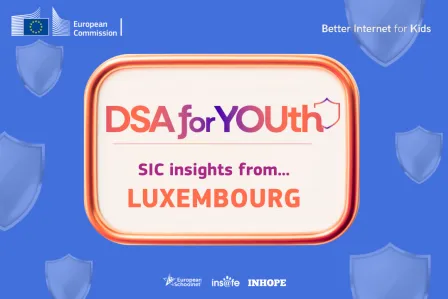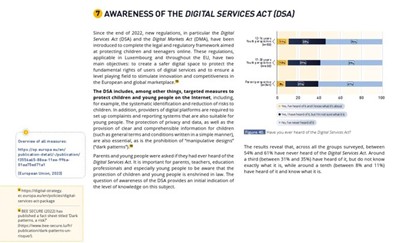This article is part of the campaign DSA for YOUth - Protecting minors by design, focusing on the DSA guidelines for the protection of minors under the DSA, including the age verification (AV) and age-appropriate (AA) measures, and translating these rules into clear, practical, and jargon-free resources. In this insight series, we explore how different Safer Internet Centres are working at the national level to raise awareness about the DSA and how it impacts the everyday lives of young people, their parents or caregivers, and teachers and educators.

BEE SECURE, the Safer Internet Centre (SIC) of Luxembourg, helps children, young people, parents, and teachers understand how the Digital Services Act (DSA) protects them online. Through creative projects, training sessions, and collaboration with national authorities, BEE SECURE makes this important European law easier to understand and more relevant to everyday life. Read on to discover more about BEE SECURE’s specific actions for different stakeholder groups.
Children and young people
BEE SECURE previously organised a two-day activity in cooperation with the project “Mediafactory” provided by the National Youth Service. Nine secondary school pupils, aged 14-20, delved into the topic of the DSA. As a result of their research and discussions, and with support from BEE SECURE experts, they produced and published a late-night show for peers to raise awareness of this important legislation. Initially, some scepticism was noted regarding the DSA topic. However, after delving deeper into their research, the young participants provided very positive feedback. They particularly appreciated that the DSA recognises young people as important individuals worthy of protection in the digital world.
The Luxembourgish SIC hosted a late-night show on the topic of the DSA
The DSA is also incorporated into various training modules to raise awareness among young people of its existence. For instance, the DSA is explicitly mentioned in the Hype im Netz training for 7th- and 8th-grade students, particularly in relation to pornography.

Moreover, as part of a series of consultations launched in autumn 2025, young people will be surveyed on various DSA-related topics. For example, they will be asked about current online trends and challenges, their knowledge of how to report inappropriate content, and their views on age verification. A corresponding format for children is currently under development. Importantly, the consultations will aim to engage young people in dialogue to better understand their experiences and perspectives, and to monitor emerging trends in online safety and digital issues.
Parents and caregivers
BEE SECURE offers three training activities for parents that emphasise the importance of online safety while supporting parents in helping their children navigate the internet safely.
Moreover, the Digital Services Act is systematically addressed in a general information session for parents to raise awareness of its existence. This session primarily focuses on raising awareness of the online risks to which children and teenagers are exposed, while also briefly addressing the relevance of DSA measures on the protection of minors. It also emphasises the important balance between technical protection tools and the respectful handling of young people’s privacy.
Teachers and educators
The Luxembourgish Safer Internet Centre provides a range of training for teachers, which also introduces the DSA. For example, a training titled TikTok, Instagram & Co. provides teachers with insights into the digital world of young people. It highlights their motives for using social media and explores both the opportunities and potential online risks, including challenges, pranks, influencers, gaming, self-presentation, and sexting. The training highlights the importance of online safety and ways to help safeguard young people online. Participants learn about the DSA, its key points, and the importance of educating children about this and other protection measures.

In more practical training activities, teachers are expected to develop methods for addressing the DSA in class. Additionally, BEE SECURE collects feedback from teachers on the DSA and gains insights into their teaching methods through relevant content and digital literacy materials. This collaborative approach aims to enhance online safety education and awareness raising, while promoting the importance and relevance of the DSA in school education.

Furthermore, BEE SECURE addresses relevant DSA topics in the framework of its regular mailings to schools, the “BEE SECURE Update”.
Research
Each year, on the occasion of Safer Internet Day (SID), the Luxembourg Safer Internet Centre publishes a trends report, The BEE SECURE Radar, available in French and English.
Among other data, it shows trends derived from surveys conducted by the SIC. The most recent edition, the Radar 2025, shows trends on DSA-related topics: for example, the awareness level of the Digital Services Act among parents and young people (“Have you ever heard of the Digital Services Act?”), attitudes towards age verification (“Content that is not suitable for children under the age of 18 should only be accessible with age verification” – level of agreement or disagreement with this statement), and so on. Additionally, around 14,894 pupils in primary and secondary education were shown a list of applications, including those from popular very large online platforms (VLOPs, as designated under the DSA) and asked to mark those that they currently use.

Working with the national Digital Service Coordinator
Digital Services Coordinators (DSCs) help the European Commission to monitor and enforce obligations in the Digital Services Act. Each Member State must designate and empower a DSC, who is responsible for all matters relating to the application and enforcement of the DSA in that country. Furthermore, DSCs can designate trusted flaggers, responsible for detecting potentially illegal content and alerting online platforms.
BEE SECURE was granted the national trusted flagger status by the DSC in September 2025. Prior to this, the National Competition Authority (acting as DSC) already served as a Member of the BEE SECURE Advisory Board and regularly gave input on the topics related to the BEE SECURE activities.
As a national trusted flagger, BEE SECURE continues to work closely with the DSC to consistently implement this new role, especially within its helpline and hotline activities. More recently, BEE SECURE has launched targeted communication activities to raise public awareness on the role and importance of trusted flaggers.
Interested in learning more about the DSA?
If you are interested in more, explore the DSA for YOUth toolkit to learn how the Digital Services Act (DSA) protects minors by design. There, you will find a family-friendly booklet explaining the DSA guidelines on what online platforms should do to keep kids and teens safe online, easy-to-read explainers, a quiz, and other resources.
Interested in learning more about activities in Luxembourg?
Find more information about the work of the Luxembourgish Safer Internet Centre, including their awareness raising, helpline, hotline, and youth participation services – or find similar information for Safer Internet Centres throughout Europe.
This article is part of the campaign DSA for YOUth - Protecting minors by design, focusing on the DSA guidelines for the protection of minors under the DSA, including the age verification (AV) and age-appropriate (AA) measures, and translating these rules into clear, practical, and jargon-free resources. In this insight series, we explore how different Safer Internet Centres are working at the national level to raise awareness about the DSA and how it impacts the everyday lives of young people, their parents or caregivers, and teachers and educators.

BEE SECURE, the Safer Internet Centre (SIC) of Luxembourg, helps children, young people, parents, and teachers understand how the Digital Services Act (DSA) protects them online. Through creative projects, training sessions, and collaboration with national authorities, BEE SECURE makes this important European law easier to understand and more relevant to everyday life. Read on to discover more about BEE SECURE’s specific actions for different stakeholder groups.
Children and young people
BEE SECURE previously organised a two-day activity in cooperation with the project “Mediafactory” provided by the National Youth Service. Nine secondary school pupils, aged 14-20, delved into the topic of the DSA. As a result of their research and discussions, and with support from BEE SECURE experts, they produced and published a late-night show for peers to raise awareness of this important legislation. Initially, some scepticism was noted regarding the DSA topic. However, after delving deeper into their research, the young participants provided very positive feedback. They particularly appreciated that the DSA recognises young people as important individuals worthy of protection in the digital world.
The Luxembourgish SIC hosted a late-night show on the topic of the DSA
The DSA is also incorporated into various training modules to raise awareness among young people of its existence. For instance, the DSA is explicitly mentioned in the Hype im Netz training for 7th- and 8th-grade students, particularly in relation to pornography.

Moreover, as part of a series of consultations launched in autumn 2025, young people will be surveyed on various DSA-related topics. For example, they will be asked about current online trends and challenges, their knowledge of how to report inappropriate content, and their views on age verification. A corresponding format for children is currently under development. Importantly, the consultations will aim to engage young people in dialogue to better understand their experiences and perspectives, and to monitor emerging trends in online safety and digital issues.
Parents and caregivers
BEE SECURE offers three training activities for parents that emphasise the importance of online safety while supporting parents in helping their children navigate the internet safely.
Moreover, the Digital Services Act is systematically addressed in a general information session for parents to raise awareness of its existence. This session primarily focuses on raising awareness of the online risks to which children and teenagers are exposed, while also briefly addressing the relevance of DSA measures on the protection of minors. It also emphasises the important balance between technical protection tools and the respectful handling of young people’s privacy.
Teachers and educators
The Luxembourgish Safer Internet Centre provides a range of training for teachers, which also introduces the DSA. For example, a training titled TikTok, Instagram & Co. provides teachers with insights into the digital world of young people. It highlights their motives for using social media and explores both the opportunities and potential online risks, including challenges, pranks, influencers, gaming, self-presentation, and sexting. The training highlights the importance of online safety and ways to help safeguard young people online. Participants learn about the DSA, its key points, and the importance of educating children about this and other protection measures.

In more practical training activities, teachers are expected to develop methods for addressing the DSA in class. Additionally, BEE SECURE collects feedback from teachers on the DSA and gains insights into their teaching methods through relevant content and digital literacy materials. This collaborative approach aims to enhance online safety education and awareness raising, while promoting the importance and relevance of the DSA in school education.

Furthermore, BEE SECURE addresses relevant DSA topics in the framework of its regular mailings to schools, the “BEE SECURE Update”.
Research
Each year, on the occasion of Safer Internet Day (SID), the Luxembourg Safer Internet Centre publishes a trends report, The BEE SECURE Radar, available in French and English.
Among other data, it shows trends derived from surveys conducted by the SIC. The most recent edition, the Radar 2025, shows trends on DSA-related topics: for example, the awareness level of the Digital Services Act among parents and young people (“Have you ever heard of the Digital Services Act?”), attitudes towards age verification (“Content that is not suitable for children under the age of 18 should only be accessible with age verification” – level of agreement or disagreement with this statement), and so on. Additionally, around 14,894 pupils in primary and secondary education were shown a list of applications, including those from popular very large online platforms (VLOPs, as designated under the DSA) and asked to mark those that they currently use.

Working with the national Digital Service Coordinator
Digital Services Coordinators (DSCs) help the European Commission to monitor and enforce obligations in the Digital Services Act. Each Member State must designate and empower a DSC, who is responsible for all matters relating to the application and enforcement of the DSA in that country. Furthermore, DSCs can designate trusted flaggers, responsible for detecting potentially illegal content and alerting online platforms.
BEE SECURE was granted the national trusted flagger status by the DSC in September 2025. Prior to this, the National Competition Authority (acting as DSC) already served as a Member of the BEE SECURE Advisory Board and regularly gave input on the topics related to the BEE SECURE activities.
As a national trusted flagger, BEE SECURE continues to work closely with the DSC to consistently implement this new role, especially within its helpline and hotline activities. More recently, BEE SECURE has launched targeted communication activities to raise public awareness on the role and importance of trusted flaggers.
Interested in learning more about the DSA?
If you are interested in more, explore the DSA for YOUth toolkit to learn how the Digital Services Act (DSA) protects minors by design. There, you will find a family-friendly booklet explaining the DSA guidelines on what online platforms should do to keep kids and teens safe online, easy-to-read explainers, a quiz, and other resources.
Interested in learning more about activities in Luxembourg?
Find more information about the work of the Luxembourgish Safer Internet Centre, including their awareness raising, helpline, hotline, and youth participation services – or find similar information for Safer Internet Centres throughout Europe.
- DSAforYOUth DSA (Digital Services Act)
Related content
- < Previous article
- Next article >













